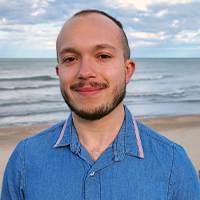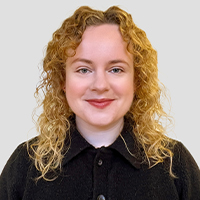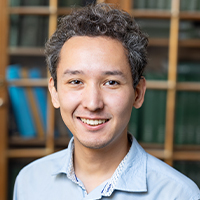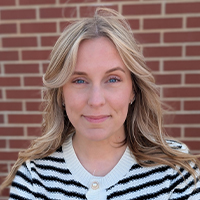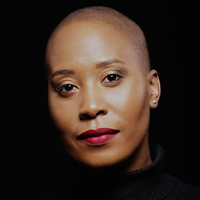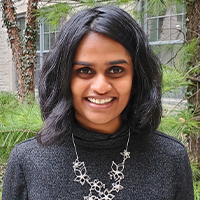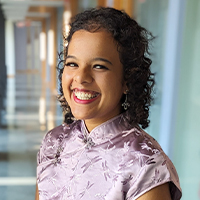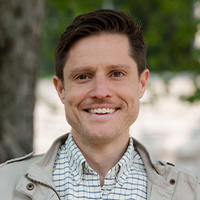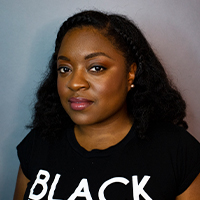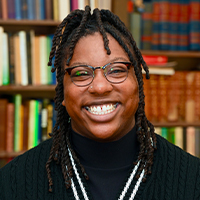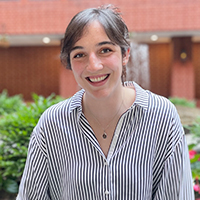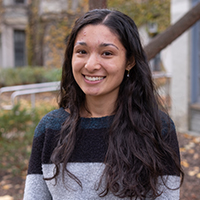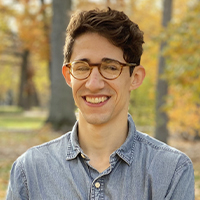Current Fellows
The Presidential Fellowship is funded by the President of the University and awarded by The Graduate School. This highly competitive award is the most prestigious fellowship awarded by Northwestern.
All recipients become members of the Northwestern Society of Fellows (which includes former members and distinguished faculty members). Presidential Fellows still completing their degrees are listed below. See past Fellows listed by induction year.
2025
Eduardo Campos Chávez
Interdisciplinary Biological Sciences (IBiS)
Eduardo Campos Chávez is a PhD candidate in the Interdisciplinary Biological Sciences (IBiS) Graduate Program in the Department of Molecular Biosciences jointly through the Weinberg College of Arts & Sciences and the McCormick School of Engineering. He is advised by Alfonso Mondragon.
Eduardo Campos Chávez is a PhD candidate in the Department of Molecular Biosciences at Northwestern University, where he studies the role of RNA molecules in cellular regulation. His research primarily focuses on riboswitches—specialized RNA structures that control gene expression in response to cellular signals. By exploring the extensive yet poorly understood domain of noncoding RNAs, often described as genomic "dark matter," his research sheds light on the complex mechanisms these molecules utilize to modulate essential biological processes.
Eduardo's current work centers on T-box riboswitches, a distinctive class of RNA that regulates amino acid metabolism. Employing advanced biophysical methods, including single-molecule imaging techniques, he recently elucidated the mechanism by which T-box riboswitches from Mycobacterium tuberculosis, a significant human pathogen, recognize specific transfer RNAs (tRNAs). These discoveries reveal important insights into the evolutionary adaptability of RNA and highlight potential avenues for developing novel antibiotic therapies.
To deepen the understanding of these molecules, he uses cutting-edge structural biology tools such as cryogenic electron microscopy (cryoEM) to obtain high-resolution molecular structures of various T-box riboswitches. His research seeks to unveil fundamental principles underpinning RNA structure, function, and evolutionary flexibility, providing critical knowledge with broad implications for medicine, agriculture, and biotechnology.
Eduardo earned his BSc in Biomedical Research at Universidad Nacional Autónoma de México, where he investigated RNA-protein interactions. Committed to interdisciplinary collaboration and science communication, he actively participates in scientific societies and outreach initiatives. He is especially dedicated to mentoring and engaging with underrepresented communities, striving to increase accessibility and inclusivity within STEM fields.
Lauren Cole
History
Lauren Cole is a history PhD candidate in the Department of History in the Weinberg College of Arts & Sciences. She is advised by Barbara Newman.Lauren Cole is a historian of medieval European medicine. Her research examines networks of medical knowledge c. 1000-1500 through the writing of twelfth-century abbess Hildegard of Bingen. Lauren works directly with manuscripts from the eleventh to fifteenth centuries, as well as early printed books from the sixteenth century, in both medieval Latin and Middle German. Through these sources, her research demonstrates how cross-cultural contact and religious frameworks shaped theories and practices of healing in medieval convents. By tracing Hildegard’s text across centuries, Lauren’s dissertation highlights the impact of women’s knowledge on the development of the medical discipline in the later Middle Ages.
Lauren is also a public historian. Under her handle @MedievalLauren on the platforms TikTok, Instagram, and YouTube, she publishes educational videos on medieval history and its connections with our present world to over 90,000 followers. In addition, she regularly appears on podcasts and interviews about the medieval past. As a first-generation student, Lauren is passionate about historical outreach and widening access to research and universities. She has worked with first-generation mentoring programs for a decade, such as Northwestern’s Arch Scholars program.
Lauren’s work has been supported by the Deutscher Akademischer Austauschdienst, the Medieval Academy of America, the Newberry Library, and the Alice Kaplan Institute for the Humanities, as well as Northwestern’s Medieval Studies Cluster, Science in Human Culture Program, and the Sexualities Project at Northwestern (SPAN). Before coming to Northwestern, Lauren earned a BA and MA in History from the University of Bristol, UK. Her publications appear in Isis: A Journal of the History of Science Society, Decoding Recipes: Histories of Knowledge and Practice Across Time and Space, and Medieval Mobilities: Gendered Bodies, Spaces, and Movements.
Alisher Juzgenbayev
Political Science
Alisher Juzgenbayev is a political science JD/PhD candidate jointly through the Pritzker School of Law and the Department of Political Science in the Weinberg College of Arts & Sciences. He is advised by Jordan Gans-Morse.Alisher's dissertation project explores how ordinary citizens navigate everyday disputes with state officials, contesting decisions like denied benefits, fines, or refused permits. By studying post-Soviet countries, he seeks to understand how citizens, even in unfree societies, leverage diverse strategies to challenge official actions: writing formal appeals to supervisors and ministry offices, seeking intervention from prosecutors and ombudsmen, utilizing personal connections, pursuing remedies through specialized administrative courts, and organizing public petitions. His research explores the diversity of these mechanisms and how citizens' experiences with them shape their perceptions of rights and conceptions of citizenship.
Through this work, Alisher aims to understand how different countries create institutions that limit official discretion and draw implications for liberal democracies, considering alternative approaches to bureaucratic accountability and administrative justice.
Alisher's dissertation builds on his broader interest and commitment to interdisciplinary research connecting law and politics. His approach draws from both fields: as senior empirical editor at the Northwestern University Law Review, he worked to incorporate methodological approaches from social science into legal scholarship, while his externship at a federal court and client advocacy experience at Legal Aid Chicago informed his understanding of how legal institutions function in practice. Alisher's scholarship examines sources of judicial legitimacy, constitutional design, and courts' roles in democratic systems. Across these interests, he integrates interviews, surveys, and computational methods to develop empirically grounded research.
Originally from Kazakhstan, Alisher holds a BA in Political Science and International Relations from Nazarbayev University. He has written on current events for the International Journal of Constitutional Law Blog, and his academic work has appeared in the Journal of Law and Courts and the Handbook on Law and Political Systems.
Victoria Lang
Earth & Planetary Sciences
Victoria Lang is an Earth & Planetary Sciences PhD candidate in the Department of Earth, Environmental, & Planetary Sciences in the Weinberg College of Arts & Sciences. She is advised by Daniel Horton.Victoria Lang is an interdisciplinary scholar working at the intersection of atmospheric modeling, air pollution, public health, and environmental justice. As a PhD candidate in the Department of Earth, Environmental, and Planetary Sciences, her research centers on improving physics-based numerical models to better simulate air pollution from traffic at the neighborhood scale, capturing local emission sources that are often obscured in national-scale assessments. Her work identifies not only pollution hotspots and their associated health impacts, but also the communities most burdened by exposure.
Victoria’s work is grounded in the belief that quantifying pollution is not enough. While efforts to reduce air pollution have improved overall outcomes, they have also deepened inequities in exposure for marginalized populations. Her dissertation advances both the technical modeling of pollution and informs solutions that can meaningfully reduce disparities in exposure. She partners with community-based organizations and national nonprofits to align her scientific work with real-world on-the-ground efforts, including publishing research on the potential outcomes of the Advanced Clean Trucks (ACT) rule in Illinois. Her findings highlighted how reducing emissions from medium- and heavy-duty vehicles could improve public health and advance environmental equity, supporting advocacy efforts as the rule was considered by the Illinois Pollution Control Board.
Victoria's research has been supported by the Environmental Defense Fund and the Health Effects Institute, and she was previously a Data Science Fellow with the Northwestern Institute on Complex Systems (NICO). She holds dual BS degrees in Meteorology and Business Administration from Northern Illinois University and Illinois State University, respectively, and an MS in Atmospheric Science from the University of Wisconsin–Milwaukee.
Natalia Molebatsi
Performance Studies
Natalia Molebatsi is a Performance Studies PhD candidate in the Department of Performance Studies in the School of Communication. She is advised by Thomas DeFrantz.
Natalia Molebatsi is the daughter of Keganneng and granddaughter of Moshidi.
Natalia’s work focuses on how poetry and its performance contribute to building communities of lifelong learning and change. She deploys multidisciplinary Performance Studies methods that enable a praxis of voice and embodiment to disrupt systems of oppression, from racism and sexism to anti-queer hate. Natalia’s dissertation, Time travel poetics: Black feminist poetry-performance and geographies of liberation, examines the tangible socio-political action and spirituality inherent in Black feminist poetry-performance, positioning it as the “vital necessity of our existence toward survival and change” (Lorde 1984, 37). Natalia argues that Black feminist poetry produces what she has termed time travel poetics, a disruption of linear time, to bring together the living and the dead, to defend the dead and affirm the living. Her research explores how Black lesbian and queer feminist artists deploy poetry and performance as technologies of survival. Her research also illustrates how poetry-performance contributes to the possibilities of living freely.
For over two decades, Natalia has created live performance and creative writing spaces across South Africa, including in schools and correctional facilities, as a way to facilitate the role of the arts in community education and healing. She is the co-founder of Black Girls Brilliance (BGB), which supports Black girls and gender expansive youth to develop leadership and social justice strategies.
Natalia is the author of two poetry collections, Sardo Dance and Elephant Woman Song. She has edited two poetry anthologies, We Are: A Poetry Anthology and the award-winning Wild Imperfections: An Anthology of Womanist Poems, a literary gathering for Black feminist poets from across the world to reach and read one another beyond the global north-south borders that force us into silos. Natalia is also published in numerous books and peer-reviewed journals, including SASINDA FUTHI SISELAPHA, agenda feminist media, the National Political Science Review, Third World Thematics, Communicatio, and GLQ: A Journal of Lesbian and Gay Studies.
Nabeel Rehemtulla
Astronomy
Nabeel Rehemtulla is an astronomy PhD candidate in the Department of Physics & Astronomy in the Weinberg College of Arts & Sciences. He is advised by Adam A. Miller.Nabeel Rehemtulla is an astronomy PhD candidate in the Weinberg College of Arts & Sciences. He is also a member of Northwestern’s Center for Interdisciplinary Research and Exploration in Astrophysics (CIERA) and the NSF-Simons AI Institute for the Sky (SkAI).
Nabeel’s research centers on building cutting-edge AI tools to advance studies of supernovae—the spectacular, explosive deaths of stars. Although they mark the end of a star’s life, supernovae also trigger the birth of a new generation of stars and accompanying planets enriched with new elements produced by the explosion, many of which are elements that pervade our daily lives.
Nabeel has developed a state-of-the-art AI tool that identifies new supernovae in astronomical images in real time. Once his AI finds a new event, it commands secondary telescopes across the globe to quickly conduct additional, more detailed observations. These observations help Nabeel link the explosion we observe with the star that preceded it, a task which has remained challenging for decades. This link helps us better understand the contributions of supernovae to the present-day Universe as factories for life-critical elements and as key pillars in the stellar circle of life.
Nabeel’s research has been supported by two NASA Illinois Space Grant Consortium Graduate Fellowships. Before attending Northwestern, he obtained a BS from the University of Michigan in Astronomy & Astrophysics. Since leaving Michigan, he has continued the research he began there, mapping dark matter in the Milky Way with Dr. Monica Valluri. Nabeel is also dedicated to producing effective and exciting visualizations that bring his research to broad audiences, and to serving his religious community through leadership roles in its professional and student networks.
Soumya Shailendra
Comparative Literary Studies
Soumya Shailendra is a comparative literary studies PhD candidate in the Comparative Literary Studies Program in the Weinberg College of Arts & Sciences. She is advised by Laura Brueck.Soumya Rachel Shailendra is a writer and arts programmer. She is a PhD candidate in Comparative Literary Studies (CLS) with a home department in Asian Languages and Cultures (ALC), specializing in postcolonial theory, modern South Asian literature, and the histories of caste radicalism. Her dissertation examines how law and literature serve as important sites of reform and redress in the global anti-caste movement. Working within a multilingual and multimodal archive, she investigates how Dalit writers—authors from historically marginalized castes—deploy legal idioms to challenge their incorporation into institutions of liberal statehood.
Soumya is a Mellon Cluster Fellow in Comparative Race and Diaspora (CRD) and served as the 2023–2024 Graduate Fellow at the Council for Race and Ethnic Studies (CRES). She co-directs Translators Adda, a public-facing translation workshop series focused on critical issues in South Asian politics and culture across the Chicagoland region.
Her collaborative work includes projects with the SpaceShift Collective, such as Starlight and From Panther to Panther, that raise awareness around caste violence and anti-caste cultural practice in Chicago’s North Side. She was a 2022–2023 Public Humanities Fellow and currently serves as the graduate assistant for the Public Humanities Graduate Practicum at the Kaplan Institute. Additionally, she has programmed artists’ and writers’ residencies for the Race, Caste, and Colorism project at the Buffett Institute for Global Affairs.
Soumya’s writing has appeared in public media platforms including Scroll.in, The Indian Express, and The Quint, as well as academic journals such as Verge: Studies in Global Asias and EuropeNow.
Esther Yoon
Medical Scientist Training Program (MSTP) and Driskill Graduate Program in Life Sciences (DGP)
Esther Yoon is a PhD candidate in the Medical Scientist Training Program (MSTP) and the Driskill Graduate Program in Life Sciences (DGP) in the Feinberg School of Medicine. She is advised by Gemma Carvill.As an aspiring physician-scientist, Esther is dedicated to understanding the genetic causes of rare diseases and developing targeted therapies to improve patients’ lives. Her thesis focuses on an emerging class of diseases caused by non-coding RNAs. She uses an interdisciplinary approach to probe how non-coding RNAs play a critical role in brain development and leverages such insights to develop RNA-based therapies that get to the root cause of the condition. Her work raises awareness about the importance of non-coding elements in our DNA, expanding our understanding of human health and our capacity to diagnose and treat diseases.
A strong advocate for conducting patient-centered science, Esther works closely with patients, families, and physicians to find a cure together. She regularly attends Coalition to Cure CHD2 meetings, where she interviews families about their experience living with rare disease and helps them understand genetic test results and current research progress. Esther’s gratitude for her mentors and peers also drives her to give back to her communities as a mentor, musician, and medical student.
Prior to becoming a Wildcat, Esther received her BS in Neuroscience from Indiana University and spent two years conducting neurogenetics research at the National Institutes of Health (NIH). At Northwestern, she has been supported by the NIH T32 Physical Genomics Training Program.
2024
Ananya Basu
Chemistry
Ananya Basu is a PhD candidate in the Department of Chemistry in the Weinberg College of Arts & Sciences.Ananya’s thesis work lies within chemical biology and targeted therapeutics, specifically in the field of targeted protein degradation. Protein degraders are an emerging class of therapies that hold great promise to expand the scope of treatable human diseases. Broadly, she draws from a suite of chemistry and biology techniques to develop a methodology to streamline the discovery process for protein degraders and extend the reach of degrader-based therapies. This work serves as a foundational step toward bringing new degraders to the clinic where they can improve patient outcomes.
Ananya received a BS in Chemistry from the University of Cincinnati, where she immersed herself in research spanning bioinorganic chemistry, organometallic chemistry, and neuro-oncology. She is a strong proponent of interdisciplinary science and is very fortunate to receive support as an NIH T32 trainee from the Chemistry of Life Processes Institute at Northwestern. She is also passionate about outreach work within and outside her department to help foster an interest in science among young people. Ananya is particularly excited by high-risk, high-reward science, and in her future career, aspires to lead by example and encourage other women to pursue careers in science and tackle high-impact research questions. When she is not in the middle of an experiment, she enjoys eating bagels, playing with the lab fish, pushing the limits of hallway agriculture, and exploring new places around Chicago by train.
Joshua Brallier
Religious Studies
Joshua Brallier is a PhD candidate in the Department of Religious Studies in the Weinberg College of Arts & Sciences.Joshua’s scholarship is driven by the question of how masculinity interfaces with religion to condone or condemn violence. His dissertation interrogates the historical life, literary output, and reception history of the famed nineteenth-century Buddhist master Do Khyentsé Yeshé Dorjé, the gun-wielding, deer-hunting, beer-drinking tantric yogi descended from a line of “bloodthirsty bandits” in eastern Tibet. Through a multimethod approach that combines close textual analysis of Do Khyentsé’s autobiographical writings, archival research on nineteenth-century Tibetan history, ethnographic fieldwork among Tibetans, and extensive interviews with contemporary specialists in Do Khyentsé’s lineage, Joshua points to the entanglements of Buddhist doctrine, Indigenous cosmology, and what he terms “bandit masculinity” in the developments of eastern Tibetan history.
Ultimately, Joshua’s dissertation argues that Do Khyentsé sat at the intersection of competing manly duties: the violence expected of him as an eastern Tibetan nomad, and the nonviolence expected of him as a powerful reincarnation of a famed Buddhist master. The way he balanced that tension illuminates a paucity in prevailing theorizations of masculinity that prioritize secularist interpretations of gender, foreclosing analytical consideration of the richly dense and thickly layered Indigenous cosmology and Buddhist metaphysics that shape Do Khyentsé’s gendered self-representation in his autobiographical writings.
Joshua’s work is driven by two normative commitments: (1) the feminist commitment to revealing that “history” is not gender neutral—even though histories rarely mark men as men, men are still bound by gender; and (2) the decolonial commitment to undermining the inertial legacy of Orientalist knowledge production in Buddhist Studies. One way Joshua works against that inertia is through textual ethnography—a method by which he reads Tibetan texts in Tibetan with their Indigenous experts. This helps guide Joshua’s reading and interpretation of Tibetan texts within the Indigenous parameters of their production and circulation.
Joshua has spent two years living with Tibetan exile communities in Nepal and India and is currently finishing a Fulbright-Nehru Fellowship conducting research at Namdroling monastery in southern India. He holds a BA in Religious Studies and English from Georgetown, an MDiv in Indo-Tibetan Buddhism from Naropa University, and an MA in Buddhist Studies from CU Boulder.
Charlene Carruthers
Black Studies
Charlene Carruthers is a PhD candidate in the Department of Black Studies in the Weinberg College of Arts & Sciences.Charlene A. Carruthers is a writer, filmmaker, community organizer, and Black Studies PhD candidate at Northwestern University. A practitioner of telling more complete stories, her work interrogates Black governance, Black and Indigenous relationality, and Black feminist abolitionist geographies. She is a 2020 Marguerite Casey Presidential Freedom Scholar and Mellon Interdisciplinary Cluster Fellow in Gender and Sexuality Studies. Her work spans more than 15 years of community organizing across racial, gender, and economic justice movements. Charlene wrote and directed The Funnel, a short film, which received the Queer Black Voices Award at PRISM, the 35th Annual Austin Gay and Lesbian International Film Festival (aGLIFF).
As the founding national director of Black Youth Project 100 (BYP100), she worked alongside young Black activists to build a national member-led organization dedicated to creating justice and freedom for all Black people. Her work has been covered in several publications including the New York Times, the Washington Post, Chicago Reader, The Nation, Ebony, and Essence Magazines. She has appeared on CNN, Democracy Now!, BBC and MSNBC. The Chicago native has also written for theRoot.com, CRISIS Magazine, Teen Vogue, Truthout, Colorlines, and the Boston Review. She is recognized as one of the top 10 most influential African Americans by The Root 100, one of Ebony Magazine's "Woke 100," an Emerging Power Player in Chicago Magazine, and is the 2017 recipient of the YWCA's Dr. Dorothy I. Height Award.
A committed educator, Charlene is also a highly sought-after speaker at various institutions including Wellesley College, Shaw University, Princeton University, Northwestern University, and her alma mater Illinois Wesleyan University. Charlene earned a Master of Social Work from the Brown School at Washington University in St. Louis, MO. She is the author of the bestselling book, Unapologetic: A Black, Queer, and Feminist Mandate for Radical Movements.
Monique Newton
Political Science
Monique Newton is a PhD candidate in the Department of Political Science in the Weinberg College of Arts & Sciences.A mixed-method scholar of American politics and Black political behavior, Monique employs ethnographic, interview, and experimental methods to examine Black political behavior in American cities. Overall, her research explores how local Black communities respond to state violence. Monique's research also delves into the local reparation movement in the United States.
Monique’s dissertation project, “Worst Behavior: How Traumatic Events Impact Local Political Participation of Black Neighborhoods in the United States,” examines how trauma is translated into a potential resource for collective mobilization. In this project, Monique incorporates collective memory-driven models and conceptualizations of trauma into the study of Black political behavior in neighborhoods across the United States. Through her dissertation research, she examines how collective memory informs contemporary collective action in the Black Lives Matter Movement.
Monique was a graduate assistant for the Center for Civic Engagement in 2021. Monique served as a Diversity Fellow for the Office of Diversity and Inclusion in The Graduate School for two years. During the summer of 2022, Monique served as a Summer Research Opportunity Program (SROP) group leader. In 2023, Monique was inducted into the Edward Alexander Bouchet Graduate Honor Society, which aims to recognize outstanding scholarly achievement and promote diversity and excellence in doctoral education and the professoriate.
As an educator, Monique has taken full advantage of the opportunities to teach non-traditional students that Northwestern offers graduate students. Monique recently taught an in-person American Government and Politics course to incarcerated men at Stateville Correction Center in Illinois through the Northwestern Prison Education Program (NPEP). Last spring, she taught a course on social justice in Chicago Field Studies.
Before attending Northwestern, Monique was a Pittsburgh Coro Fellow in Public Affairs. Monique holds a BA in Politics and Law & Society from Oberlin College. Her work has appeared in the Russell Sage Journal and the Washington Post.
Margaret O'Connell
Chemical Engineering
Margaret O'Connell is a PhD candidate in the Department of Chemical and Biological Engineering in the McCormick School of Engineering.Margaret "Maggie" O’Connell works in the Systems Analysis Research Group under Professor Jennifer Dunn. She uses interdisciplinary techniques to approach sustainability from technical, political, and cultural perspectives.
The question of “what is sustainable?” is one engineers often try to answer through different assessment processes. For instance, Maggie employs life cycle and techno-economic analyses to understand cost, energy, and land use tradeoffs associated with emerging water treatment technologies. But the question of “what is sustainable?” goes far beyond cost and emissions calculations. What is sustainable depends greatly on values, worldviews, and culture. It depends on who defines sustainability and who chooses policies that promote some, but not other, technology options. No technology comes without tradeoffs, and her work examines over a dozen sustainability assessments used for decision-making purposes at state and federal levels, exploring how these assessments either affirm or violate Indigenous sovereignty via their inclusion or exclusion of participatory processes. These insights are fundamental to her ongoing collaboration with Ojibwe Tribes which aims to transform these assessments by shifting sustainability from a matter of emissions to a matter of relationships – relationships within ecosystems and relationships between peoples and cultures.
Maggie herself is non-native and continues to learn from ongoing relationship-building, working with collaborators to root sustainability measures in both Indigenous and Western knowledge systems. Her research demonstrates that sustainability can be achieved only when solutions are developed in a culturally relevant, sovereignty-affirming manner.
Maggie received a BS in Chemical Engineering from Princeton University, and while at Northwestern has received the Ryan Fellowship and Northwestern Institute on Complex Systems (NICO) Intersection Science Fellowship.
Jillian Rastinejad
Astronomy
Jillian Rastinejad is a PhD candidate in the Department of Physics and Astronomy in the Weinberg College of Arts & Sciences.Jillian Rastinejad is an astronomy PhD candidate in the Department of Physics and Astronomy in the Weinberg College of Arts & Sciences and a member of the Center for Interdisciplinary Research and Exploration in Astrophysics (CIERA). She is advised by Wen-fai Fong.
Jillian leverages world-class telescopes to study astronomical explosions that create heavy elements, including iodine, silver, and gold. Despite their prevalence in our day-to-day lives, these heavy elements did not exist at the Universe’s birth, and their astronomical birthplaces are still not well understood. Jillian’s research has challenged long-standing paradigms of where the heavy elements are born and found that the signatures of heavy elements are more diverse than previously expected. She leads observing programs on premiere telescopes, including the Hubble Space Telescope and the twin Gemini Observatories in Chile and Hawai’i, using them to rapidly respond to alerts from NASA satellites pointing to the location of a new explosion. Jillian is also an active member of the Searches After Gravitational-waves Using ARizona Observatories (SAGUARO) collaboration, which looks for the counterpart explosions to gravitational wave events, minuscule ripples in space-time that are only recently being discovered by detectors on Earth.
Jillian obtained a BA in Physics and Human Rights from the University of Connecticut and was previously a Northwestern Data Science Fellow. She is passionate about astronomy outreach, having created and led a Data Science for the Public Good conference, contributed to astronomy high school mentoring programs, and worked with journalists to bring astronomy news to the public.
David Silverman
Psychology
David Silverman is a PhD candidate in the Department of Psychology in the Weinberg College of Arts & Sciences.David is a social and educational psychologist whose work primarily focuses on identifying opportunities to create stronger and more just school systems. His research is inspired by his experiences growing up around the Middle East and Central Europe which exposed him to the power of schools, educators, and other key social forces to shape students’ lives, particularly among students from lower-income families.
Along with his mentor, Dr. Mesmin Destin, David has explored the specific psychological pathways through which these social forces contribute to, and can help dismantle, persistent educational inequities. For example, his dissertation work employs a wide range of methodologies to demonstrate the importance of preparing educators to meaningfully engage with students and the valuable skills, knowledge, and resources that they often gain as a direct factor of their otherwise marginalized identities. Although school systems often dismiss or devalue these strengths, David has consistently shown that supporting educators to recognize and reward them in the classroom has a variety of important benefits for both educators and their students from lower-income families. This ranges from leading students to feel more comfortable and confident in the classroom, to decreasing their feelings of anxiety about the future, to even increasing their grade-point averages and likelihood of graduating from university. David is currently focused on extending these insights beyond the classroom to other key elements of society that contribute to (in)equity, including the workplace, educational policy, and social scientific research more broadly.
David’s research is supported by the National Science Foundation’s Graduate Research Fellowship and generous support from a variety of educational organizations. Before coming to Northwestern, David received his BA in Public Health and Psychology at the University of Virginia and served as a data analyst for two-year colleges across the United States.
